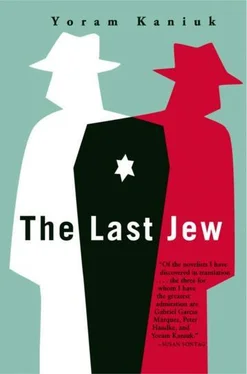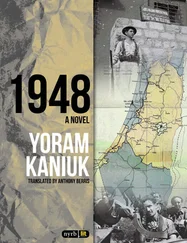Tell the old lady her son has come back home, said Ebenezer.
Ahbed pushed Ebenezer, managed to lock the door, and disappeared. He put the suitcase down on the tiles at the entrance and waited.
A short while later, Ahbed opened the door a little and said: She said her son is dead, but since you're here already, come in. Fanya R. smiled. Ebenezer hugged her, and said: When we come to Israel, my mother will be excited. And Ebenezer tried to remember if it really was Rebecca, whose flyswatter he could hear now, curious. But he couldn't remember. When Ahbed asked them to come in to what was called the "salon," they walked like two frightened children. Ahbed locked the door behind them. Rebecca sat in an easy chair at a table with black domino tiles. Even Fanya R. could guess that Rebecca had just won a victory. She surveyed Ebenezer for a long time and her old beautiful eyes turned to Fanya R. She examined her impassively, and said: Ebenezer Schneerson, you were dead!
Her face was covered with a cloud of rumination and she looked as if she were trying to solve a riddle without help from anybody. She said: Now the Captain will have to move out of Boaz's house!
Whose?
Boaz's, she repeated. Ebenezer looked at her and tried to recall, but he couldn't. Fanya R. sat down on a chair, put her hands on the arms, one of which was carved with tiny features, and Ebenezer said: I'll live in Tel Aviv, near Samuel.
Who's Samuel? asked the old woman.
Samuel, said Ebenezer.
The old woman looked outside and saw the avenue of almond trees, and said: Where were you? He tried to think. Nothing concrete was clear to him. Where was I for so many years? He said: Samuel is my son, he came out of the camp and he'll come.
They told me you always wanted to go to America, added Ebenezer. Did you go? She smiled and wrung her hands. Ahbed entered the room and smiled. Ebenezer saw a carved bird on the windowsill. He looked at it and strong yearnings for the smell of sawdust filled him.
They were right, said the old woman.
But it's easier to find people here, said Ebenezer, Israel is smaller. And Rebecca said to Ahbed: Bring my son and that woman some cold juice and bring me wine. Ahbed looked at Ebenezer, blinked his eyes, tried to remember something, and went out.
He's the great-grandson of Ahbed, said the old woman. They always stay with me. When they attach Arabs to Israel, there's somebody to rely on. They're not Jews who disappear for fifty years and come to ask for Boaz's house for themselves.
Who's Boaz?
Your son. She said and smiled. And then she realized there was a danger lurking here whose nature she hadn't yet grasped. She looked at her son and thought about her father. A thousand years of life in distant places streamed from Ebenezer's face. She said: You left Ebenezer and you came back as some Diaspora Jew.
Fanya R. drank the juice Ahbed gave her. Rebecca started getting bored. For a moment she thought of Nehemiah as if he tried again to betray her and die for nothing. She said: Boaz is now my son, you were my son, maybe you still are my son, but you're old, Ebenezer, there were wars here and there's suddenly a state, there were locusts! Does your wife have sons? She had daughters, said Ebenezer.
Rebecca didn't respond, she got up with the suddenness that was always typical of her, came to Ebenezer and kissed his cheeks. For a moment, she was soft, her fingers combed his hair, and then she hugged the back of Fanya R., who straightened up and leaned forward. Then they sat down and were silent. Ahbed brought black coffee and they drank and ate cookies and peanuts and tiny sandwiches filled with cheese that was sweet but sharp. The fragrance of basil stood in the air. After dark, they moved to the dining room and sat around the table. Ebenezer tried to tell in three sentences what he remembered. Rebecca fell asleep and Ahbed came and carried her to her room sitting in her chair. Fanya R. picked up a carved bird that contained a lot of force. Tears flowed from her eyes at the sight of the birds on the windowsills. Ebenezer said: Look at the beautiful birds the old woman has.
The next day, Mr. Klomin came. He told Ebenezer how awful the Holocaust was, and Ebenezer listened to him and tried to mutter something but couldn't. All he remembered were things he wasn't sure had happened to him. From Mr. Klomin's words, he understood who Mr. Klomin was.
These things I'm saying now, I also know from what I heard, how I came to Rebecca's house, how she kissed me, how I didn't know who Klomin was, how I didn't know who Boaz was.
When Mr. Klomin told about Boaz, vague things started to clear up in his brain. He stroked Fanya R. and inquired about Boaz, he was sure they were talking about Samuel. Klomin said: He hangs around the house of the Teacher Henkin who lost a son in the war. A handsome fellow. And Klomin took a photo out of the drawer and showed it to Ebenezer. Ebenezer smiled and said: That's Samuel. And Fanya R. said: That's an old picture of Joseph Rayna.
When his bags came from the port, Ebenezer went to Tel Aviv and bought the Giladi house. When Boaz came to see him, Ebenezer said: Samuel, and fainted. For three days Ebenezer wept in a closed room and thought. After he came out of the room he almost knew things he hadn't known before that he knew. Boaz, who was disappointed, didn't show his emotions. He was scared as never before in his life. Fanya R. told him about her daughters. Their skin, she said, was grafted onto the body of a German who was burned in a tank. But when Ebenezer tried to understand who Boaz was and how he wasn't Samuel, Boaz said: Never mind, it's not so important, he left the house, and when he got to the corner of Hayarkon Street, he entered a yard and banged his head against a wall for a long time.
Mr. Klomin, who envisioned the meeting between Boaz and his father, began to feel a certain closeness to his grandson, maybe because time wasn't working to his advantage now, as he put it, or because Dana became concrete before his eyes the moment Ebenezer called his son Samuel.
Once every two weeks, for years, Mr. Klomin and Captain Jose Menkin A. Goldenberg would meet in Tel Aviv to discuss their party affairs. Most of the people who had joined them over the years had died or were in old people's homes or in hospitals and had stopped being interested in the renewed Kingdom of Israel. A gigantic yoke of keeping the flame, as he defined it, fell on Klomin, and became heavier from year to year. The return of the last son gave him certain hopes that inconceivable things were happening. If Ebenezer came back, he said to the Captain as they walked in the street to their regular meeting place, all kinds of things can happen, he said and didn't elaborate. The two of them were up in years now. Whenever they'd walk in the street they'd discover a new city they hadn't known before, partly because they forgot. Suspicious-looking cars passed by and stopped at traffic signals that had just been planted on street corners. Mr. Klomin meditated aloud about the connection between the words grief and brief, dissect and connect, brave and wave, and then they went into the small old-fashioned cafe where they had once prepared the great revolt against the British Empire. They sat down in their regular places at the back window behind a gigantic bush that had turned gray over the years. Hidden from the eyes of passersby, they sat and whispered to one another. The Captain's uniform had faded long ago, a new replacement hadn't come. His once elegant hat looked shabby, even though he took such devoted care of it. He was already starting to forget for rather long periods why he ever had to go back to Egypt. As a sign of the passing years, he said to Mr. Klomin: I don't edit a French newspaper anymore, and Mr. Klomin, who had never believed the Captain had ever edited a newspaper in Cairo, thought to himself a bit, looked at the damp walls, the red plastic chairs, and said: Maybe you really didn't edit a newspaper for many years. The Captain's praise-wreathed past had faded with the years, bereft of that importance that had once been ascribed to it. And one of the two said, they didn't remember anymore which of them said it: Maybe we have to turn over a new leaf? And the Captain adjusted his folds that had grown flaccid, drank the thin coffee, and a shriveled old waitress, who remembered her youthful grace through them, said to her replacement waitress: Those were giant years, you felt electricity in the air, and what secrets they whispered there, and the new waitress came to them, bored, asked if they wanted anything, offered them the famous cheesecake and they laughed, in unison they laughed, and said: Us, cheesecake? Sometimes toast, not today, and then they gave in and ordered nut cake and said it was good, even though it had stood four days on the counter waiting for a defeated and hungry army, she pulled her apron, wiped a table that was already clean, looked bored toward another table covered with crumbs, and sat down to look at the street.
Читать дальше












